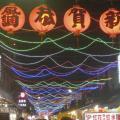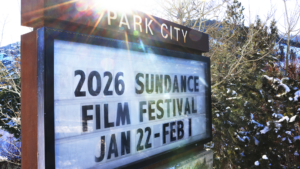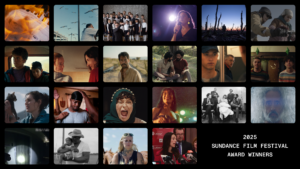Jeff Orlowski
For the past two years, Film Forward has travelled to China as one of four international locations. This year unique in that the close of our time in China, we also travelled to Taiwan. Taiwan and China are currently facing significant growth and development, but they are handling these challenges in very different ways. Bringing Chasing Ice—a film about climate change and the way humans interact with the environment— to both locations was therefore extremely interesting.
Before joining Film Forward in Beijing, I spent four days working with the Sundance Institute for a Documentary Lab workshop. It was in collaboration with CNEX, a Chinese film organization focused on developing Chinese documentary filmmaking. Along with some amazing mentors from the U.S. and the U.K., we worked with 10 doc filmmakers from Taiwan, Hong Kong, and China. These artists are pioneering a path of independent film in Asia, especially in mainland China where censorship has limited free speech for many years.
The projects that they were working on fascinated me. One of the most common themes was about the rapid growth of China. How does the country deal with its huge amounts of waste? There is currently a circle of trash engulfing Beijing that can be seen from satellite imagery. How do they deal with the mass migration of people leaving the countryside looking for work in the big cities? How do the small towns maintain their culture or even just survive when all the youth all move away?
When we were in Beijing, the locals said that the air quality was some of the best they had seen in a long time. However, it was the dirtiest air I have ever experienced anywhere in the world. I got a respiratory infection after 5 days in the country. When driving to the countryside, all you see are identical apartment complexes springing up everywhere. The landscape was replaced with construction and pollution everywhere I turned.
Meanwhile in Taiwan, they seem to be going through an opposite shift. I’ve been there over half a dozen times since I was 3 years old, and found that over time the air has actually been getting cleaner. They have installed a new rail system, the MRT, that is fast and amazingly clean. Furthermore, if you eat or drink on the train, you’re fined approximately $250.
So many people use the public transportation that the traffic on the roads is getting better and better. Somebody told us that they used to be able to blame “bad traffic” for being late, but they can no longer use that as an excuse. And another thing that amazed me were the vertical gardens. Outside any construction site in the city, the construction company legally needs to plant a vertical garden outside the site.
During the Q&As for Chasing Ice, I often ask people if the film changed their perspective on climate change. It’s always a tricky question to ask because there are so many variations on what one might think about the issue. If they already think that climate change is happening, then the film might not “change” their perspective.
When I asked that question in Taiwan, we got some good responses. Maybe a third to a half of the audience raised their hands. But when I asked the question in mainland China, virtually every hand went up. Based on those limited examples, it seemed as though Taiwan was more knowledgeable of these environmental issues. They recognize the impact we’re having on the planet, and they understand the need for us to live sustainably as a society.
As I flew back into Los Angeles, seeing the sprawling city for the first time in a few weeks, I could literally see the traffic on the streets. And I realized that even in the U.S., we are facing a similar struggle. We can either go down the route of Taiwan, with efficient public transportation, minimizing traffic and improving air quality. Or we can go down the route of China, polluting the air we breathe and harming our health.
While this is clearly a simplification of a big issue, to me the choice is clear.




